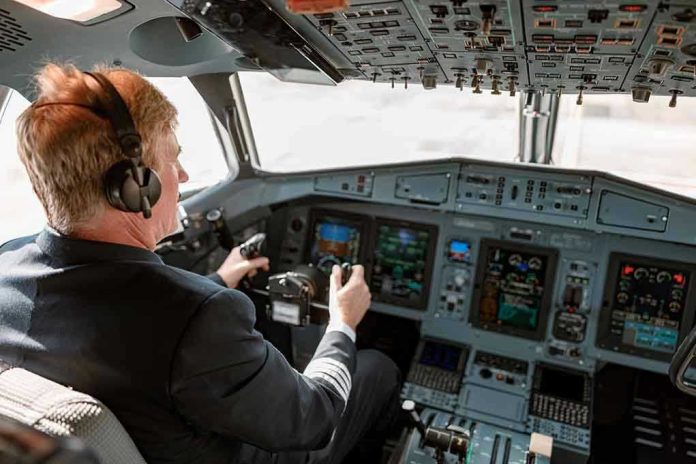
Direct flights between Moscow and Pyongyang are now a reality for the first time ever, and if you’re wondering what that says about today’s “new world order,” you’re not alone—because the global chessboard just got a lot more unpredictable, and not in a good way for U.S. interests.
At a Glance
- Russia and North Korea launch first-ever direct passenger flights between Moscow and Pyongyang.
- Turkey and Syria resume air links after 13 years, cementing new regional alliances.
- Both moves driven by shifting alliances, Western sanctions, and post-pandemic industry recovery.
- Experts warn these air corridors could deepen authoritarian ties and sideline U.S. influence.
New Air Corridors Signal a Shift in Global Alliances
For decades, a direct flight between Moscow and Pyongyang was unthinkable—a Cold War artifact locked away by layers of sanctions, isolation, and international scrutiny. Now, with the touch of a button and a monthly schedule, Russia and North Korea have opened a sky-bridge that’s about a whole lot more than tourism. This is about signaling allegiance, poking the West in the eye, and tightening the embrace between two of the world’s most notorious authoritarian regimes. At the same time, Turkey and Syria, after a long freeze in relations, have started flying directly between Ankara and Damascus, signaling a shift in Middle Eastern alliances that should have every U.S. policymaker on high alert.
⚡️Russia starts first Moscow-Pyongyang passenger flights in decades, signaling closer ties.
As another sign of deepening relations, Russian is set to launch direct Moscow-Pyongyang flights — the first air connection between the two capitals in years.https://t.co/fLhbDCjcMg
— The Kyiv Independent (@KyivIndependent) July 27, 2025
According to official statements, July 27, 2025, marked the first-ever direct passenger flight from Moscow to Pyongyang, operated by Nordwind Airlines. The Russian Transport Ministry declared, “This is the first time the capitals of Russia and the DPRK will be linked by direct flights.” Not to be outdone, Turkish Airlines, Syrian Air, AnadoluJet, and AJet have all joined the resumption of Turkish-Syrian air routes, with flights running multiple times a week. These are not minor developments—they’re milestones with the potential to reshape trade, diplomacy, and the balance of power across two continents.
Geopolitical Motivations: Why Now?
What’s driving these sudden changes? In a word: desperation. Russia, strangled by Western sanctions and desperate for new friends, is pivoting eastward as fast as its jets can fly. North Korea, ever the pariah, is eager to show it still has powerful patrons. For both, direct air links are more than a convenience; they’re a symbol of defiance, a thumbed nose at a world order they see as rigged against them. Meanwhile, Turkey, seeking to reassert itself after years of chaos on its southern border, is cozying up to Syria in an effort to stabilize the region—and, not coincidentally, to push back against U.S. influence in the Middle East.
For the aviation industry, these routes represent a shot in the arm after the devastation of the COVID-19 pandemic, but for the rest of us, they are a canary in the coal mine. When regimes like Russia and North Korea start building bridges instead of burning them, it’s not about peace and understanding; it’s about fortifying their defenses and plotting their next moves. And let’s not kid ourselves: the United States is not being invited to this new roundtable.
Impacts on Regional Stability and U.S. Interests
The immediate effect of these new air routes is to facilitate travel and trade between capitals, but the long-term consequences are far more concerning. In the Middle East, Turkey’s rapprochement with Syria could lead to broader regional integration that sidelines U.S. interests and emboldens regimes with little respect for democracy or human rights. In East Asia, Russia’s overt support for North Korea—now made literal by direct flights—could further destabilize a region already on edge.
Analysts warn that these developments could erode the leverage the U.S. and its allies have painstakingly built over decades. When countries like Turkey and Russia start dictating the terms of engagement, the rules-based order that has (however imperfectly) kept the peace is put at risk. The normalization of relations between Turkey and Syria, and Russia and North Korea, is being celebrated in those capitals as a win for sovereignty and independence. But let’s call it what it is: a retreat from accountability, a rejection of Western values, and a warning shot aimed squarely at Washington.
What the Experts Are Saying—and What Comes Next
Aviation industry experts call these developments a sign of sector recovery, but even they acknowledge that the political symbolism far outweighs the economic benefits. Geopolitical analysts note that the Moscow–Pyongyang flights could facilitate not just economic exchange, but also diplomatic and possibly military cooperation. Middle East observers see Turkey’s actions as part of a broader realignment that could see refugees pushed back into Syria, with unpredictable consequences for regional stability.
Some experts still hold out hope that renewed air links might serve as humanitarian corridors or platforms for negotiation. But history—and common sense—suggest otherwise. When authoritarian regimes make nice, it’s rarely the average citizen who benefits. Instead, these alliances tend to produce more repression, less freedom, and a world that’s a little less safe for anyone who believes in democracy, free markets, or the rule of law.
Sources:
VisaVerge (Turkish-Syrian flights)
Anadolu Agency (Turkish-Syrian flights)
Yeni Şafak (Russia–North Korea flights)




